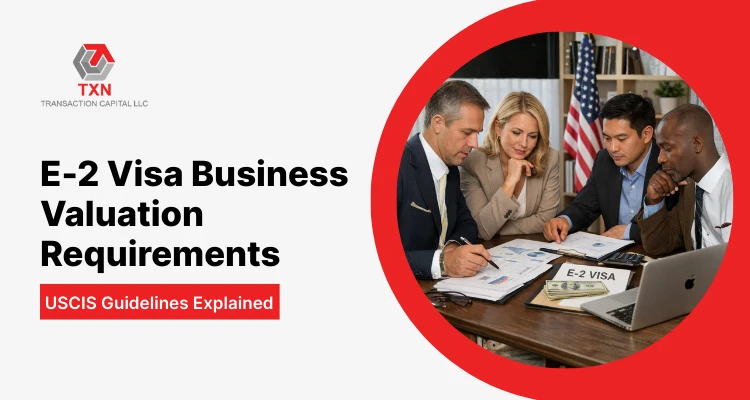Understanding 409A Valuation: A Crucial Guide for Startups and Investors

Introduction
A 409A valuation determines the Fair Market Value (FMV) of a private company’s stock, a vital process under Section 409A of the U.S. tax code. Startups often use equity-based compensation to attract talent, making this valuation essential for ensuring IRS compliance, transparency, and strategic growth. By partnering with Certified Business Valuers, startups gain reliable business valuation services tailored to their specific needs.
What is a 409A Valuation?
A 409A valuation appraises the FMV of a private company’s common stock. It sets the strike price for stock options and ensures compliance with IRS Section 409A regulations. Without one, companies face hefty tax penalties and risk losing employee trust. Certified business valuers, such as those holding ASA (Accredited Senior Appraiser), ABV (Accredited in Business Valuation), and CVA (Certified Valuation Analyst) credentials, follow standards like USPAP (Uniform Standards of Professional Appraisal Practice) and SSVS (Statement on Standards for Valuation Services) to ensure compliant and defensible valuations.
Advanced Valuation Techniques
Certified business valuers use advanced methods like the backsolve method, particularly for early-stage startups with complex cap tables and liquidation preferences. Detailed reports include essential disclosures such as:
- DLOC (Discount for Lack of Control)
- DLOM (Discount for Lack of Marketability)
- Normalizing Adjustments
- Basis of Value
- Subject Interest
- Appraiser’s Certification
These comprehensive 409A valuation reports ensure transparency, compliance, and audit readiness. Intangible asset valuation, equity valuation, and financial reporting valuation are integral components, safeguarding startups during audits, acquisitions, and equity distribution.
Common 409A Valuation Methodologies
Certified business valuers use IRS-approved methods to determine FMV:
- Market Approach (OPM Backsolve): Derives FMV from preferred stock prices during funding rounds.
- Income Approach (Discounted Cash Flow): Calculates the present value of future cash flows, adjusted for risk. Ideal for companies with stable revenue.
- Asset Approach: Suitable for early-stage startups, focusing on tangible assets and liabilities.
These methodologies are critical for achieving IRS-compliant 409A valuations, certified business valuation reports, and audit-ready 409A valuation documentation.
Why Certified Valuers Are Essential
Certified professionals adhere to strict standards like USPAP, ensuring compliant and transparent valuations. Techniques such as the backsolve method, along with mandatory disclosures like DLOC, DLOM, and the appraiser’s certification, provide defensible reports that withstand IRS scrutiny, audits, and acquisitions.
Engaging startup valuation experts for ESOP valuation services, 409A Valuation, Fair Market Value Appraisals, and ASC 718 valuations ensures legal compliance and investor confidence.
Common Myths About 409A Valuations
- Using Different Forecasts Presenting optimistic financial projections to the board while using conservative forecasts for 409A valuations can lead to challenges from auditors and acquirers, jeopardizing safe harbor protection.
- Focusing on the Lowest Possible Strike Price Aiming for the lowest strike price may seem beneficial but can attract scrutiny. Employees benefit more from the company’s growth than marginally lower strike prices.
- Venture Capital Valuations Are Enough VC valuations focus on growth potential and preferred shares, unlike 409A valuations that reflect FMV for common stock, ensuring compliance.
- 409A Valuations Are Too Expensive Affordable services like those from Transaction Capital LLC, led by experts with ASA, ABV, and CVA credentials, ensure quality and compliance. Adhering to USPAP and SSVS standards, these professionals deliver accurate, defensible valuations, proving that certified 409A valuations can be both reliable and cost-effective.
Frequently Asked Questions (FAQs)
Q 1. How is a 409A Valuation Different from a VC Valuation?
While Venture Capital valuations focus on preferred shares and investor expectations, 409A valuations prioritize FMV for common stock to meet tax compliance.
Q 2. How Does DLOM Impact a 409A Valuation?
The Discount for Lack of Marketability accounts for the reduced liquidity of private company shares, significantly influencing FMV.
Q 3. Can Convertible Note Caps Be Used for 409A Valuations?
No, valuation caps represent potential future value and cannot replace the current FMV required for 409A valuations.
Q 4. What Happens If a 409A Valuation is Not IRS-Compliant?
Noncompliance can lead to severe penalties, including a 20% tax on stock options and back taxes with interest.
Q 5. How Often Are 409A Valuations Valid?
Typically valid for 12 months or until significant events alter the company’s value.
Q 6. What Certifications Are Required to Issue a 409A Valuation?
While no certifications are legally required to issue a 409A valuation, practitioners often hold credentials like ASA® (Accredited Senior Appraiser), ABV® (Accredited in Business Valuation), or CVA® (Certified Valuation Analyst) to enhance credibility. The IRS defines a qualified appraiser as someone with “significant knowledge, experience, education, and training,” typically with at least five years of relevant experience.
Engaging certified professionals who adhere to USPAP, SSVS, and NACVA standards ensures compliance, mitigates risks, and delivers defensible, audit-ready valuations.
Q 7. Why Are Certified Business Valuers Essential?
Certified professionals provide defensible valuations adhering to USPAP and IRS standards, ensuring compliance and transparency.
Q 8. What is the Role of ASC 718 in 409A Valuations?
ASC 718 governs the accounting treatment of stock-based compensation, making audit-ready valuations crucial for compliance.
Q 9. Should You “Sandbag” Your 409A Valuation?
No, sandbagging by withholding significant opportunities can invalidate a valuation. Honest disclosures ensure compliance and prevent costly revisions or IRS penalties.
While VCs may qualify under Section 409A, independent appraisers provide the necessary expertise and credibility to meet compliance standards.
Historically, common stock under 409A valuations ranged from 20%-30% of preferred stock value. By the year, the ratio shifted to 25%-50% due to growing investor confidence.
Q 12. Why Is a Company Valued Differently Between Post-Money Investment and 409A Valuation?
Post-money valuations focus on preferred shares and optimistic projections, while 409A valuations prioritize FMV for common stock with a conservative approach.
Q 13. Do VCs Care if the 409A Valuation Comes in Low?
For early-stage companies, VCs often prefer lower valuations for tax benefits. As companies grow, certified valuations become essential for compliance and credibility.
Q 14. How Do Liquidation Preferences Affect 409A Valuation?
Liquidation preferences often reduce common stock value to 20%–40% of preferred shares, reflecting their subordinate position.
Q 15. How Often Are 409A Valuations Disputed?
Although the IRS rarely disputes 409A valuations directly, auditors, employees, and acquirers often scrutinize them. Auditors may question assumptions during financial statement audits, causing delays if discrepancies arise. Employees might dispute stock option values if projections differ from those in the 409A valuation. Acquirers meticulously review pricing during acquisitions, and errors could jeopardize transactions. Certified valuers help mitigate these risks by providing defensible valuations.
Q 16. What Happens During an Audit If a 409A Valuation Is Challenged?
Audits typically question assumptions, methodologies, or discrepancies in valuation data. Certified reports that comply with USPAP and SSVS standards reduce risks of penalties and delays.
Scenarios Requiring 409A Valuation Updating
Startups must update valuations in scenarios like:
- New funding rounds that significantly impact valuation.
- Major milestones like product launches or market expansion.
- Mergers, acquisitions, or IPOs.
- Annual updates to reflect business condition changes.
Timely updates in startup 409A valuations prevent tax penalties, ensure equity transparency, and foster investor trust.
Importance of 409A Valuation
- IRS Compliance: Reflects FMV under Section 409A to avoid penalties.
- Equity Valuation Accuracy: Ensures fair compensation for employees and investors.
- Legal Protection: Provides defensible reports for audits and acquisitions.
- Investor and Employee Trust: Demonstrates fairness, aiding retention and confidence.
Certified 409A valuations also streamline ASC 718 valuation compliance and stock option valuations, critical for growth-oriented startups.
Conclusion
A 409A valuation is a cornerstone of strategic planning for startups and investors. By partnering with certified valuation professionals, companies ensure IRS compliance, transparent equity pricing, and enhanced credibility with employees and investors. Reliable and audit-ready 409A valuations empower startups to attract and retain talent, secure funding, and prepare for future growth while avoiding costly penalties and disputes. Emphasizing the importance of certified business valuers helps startups navigate complexities with confidence. Additionally, audit-ready 409A valuation services support long-term financial health and investor satisfaction.
🚀 Fast, Audit-Ready 409A Valuation Services Starting at $500! 🚀
- 409A Valuation Services Starting at $500
- Delivered in 2–5 Business Days
- Phone +1 (917) 809-4838
- Email: info@txncapitalllc.com
- Website: txncapitalllc.com
- Telegram: saurobhbarick
Tag :
409A
409A Valuation
409A Valuation Methods
IRS Audit Valuation Services
Leave a Reply
Logged in as admin. Edit your profile. Log out? Required fields are marked *
Dr. Gaurav B.
Founder & Principal Valuer, Transaction Capital LLC
Specialist in IRS-Compliant 409A & Complex Valuation Matters
Dr. Gaurav B. is the Founder and Principal Valuer of Transaction Capital LLC, a valuation and financial advisory firm providing independent, standards-based valuation opinions for startups, growth-stage companies, and established enterprises.




